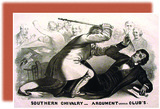
The Compromise of 1850The Kansas-Nebraska Act and the Republican PartyThe Dred Scott Decision and Sectional StrifeJohn Brown and the Election of 1860
- Subject:
- Social Science
- Material Type:
- Module
- Author:
- OpenStax College
- Date Added:
- 07/18/2021

The Compromise of 1850The Kansas-Nebraska Act and the Republican PartyThe Dred Scott Decision and Sectional StrifeJohn Brown and the Election of 1860

By the end of this section, you will be able to:Describe John Brown’s raid on Harpers Ferry and its resultsAnalyze the results of the election of 1860

By the end of this section, you will be able to:Explain the contested issues that led to the Compromise of 1850Describe and analyze the reactions to the 1850 Fugitive Slave Act

By the end of this section, you will be able to:Explain the importance of the Supreme Court's Dred Scott rulingDiscuss the principles of the Republican Party as expressed by Abraham Lincoln in 1858

By the end of this section, you will be able to:Explain the political ramifications of the Kansas-Nebraska ActDescribe the founding of the Republican Party
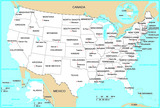


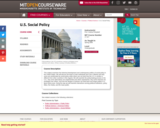
This subject examines the historical development and contemporary politics of social policy in the United States. We will discuss the kinds of risks individuals face over a lifetime and why some are ameliorated by social policy while others are not (and how the U.S. is similar or different from other countries in this regard). We will examine the policymaking process in the U.S., why some alternatives are implemented and others abandoned, why some interests are privileged over others, and how the designs of policies can feed back and shape politics in a given policy area. Along the way we will examine interactions among political institutions, policy elites, the media, and the mass public.
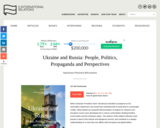
When Ukrainian President Victor Yanukovych decided to postpone an EU Association Agreement, few would have predicted that it would lead to a prolonged conflict. What started as a peaceful demonstration of support for Ukraine’s pro-European course soon developed into a vicious confrontation dividing families, communities and the Ukrainian nation. The authors of this Edited Collection each present a facet of the intense and dangerous turmoil, and contribute to a deeper understanding of a crisis that now afflicts both European and global affairs.
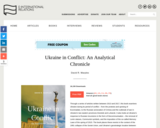
Through a series of articles written between 2013 and 2017, this book examines Ukraine during its period of conflict – from the protests and uprising of Euromaidan, to the Russian annexation of Crimea and the outbreak of war in Ukraine’s two eastern provinces Donetsk and Luhansk. It also looks at Ukraine’s response to Russian incursions in the form of Decommunisation – the removal of Lenin statues, Communist symbols, and the imposition of the so-called Memory Laws of the spring of 2015. The book places these events in the context of the 1991 collapse of the Soviet Union, and Ukraine’s geostrategic location between Russia and the European Union. It seeks to provide answers to questions that are too often mired in propaganda and invective and to assess whether the road Ukraine has taken is likely to end in success or failure.
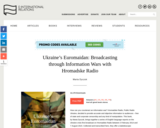
How can you counteract an information war? Hromadske Radio, Public Radio Ukraine, decided to provide accurate and objective information to audiences – free of state and corporate censorship and any kind of manipulation. This book, by Marta Dyczok, brings together a series of English language reports on the Ukraine crisis first broadcast on Hromadske Radio between 3 February 2014 and 7 August 2015. Collected and transcribed here, they offer a kaleidoscopic chronicle of events in Ukraine. Bookending the reports, purpose written introduction and conclusion sections contextualize the independent radio project within the larger picture of Ukraine’s media and political developments – both before the Euromaidan and in its dramatic aftermath.
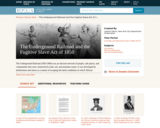
This collection uses primary sources to explore the Underground Railroad and the Fugitive Slave Act of 1850. Digital Public Library of America Primary Source Sets are designed to help students develop their critical thinking skills and draw diverse material from libraries, archives, and museums across the United States. Each set includes an overview, ten to fifteen primary sources, links to related resources, and a teaching guide. These sets were created and reviewed by the teachers on the DPLA's Education Advisory Committee.
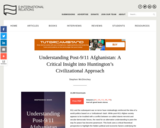
9/11 and the subsequent war on terror have misleadingly reinforced the idea of a world politics based on a ‘civilizational’ clash. While post-9/11 Afghan society appears to be troubled with a conflict between so-called Islamic-terrorist and secular-democratic forces, the need for an alternative understanding to pave the way for peace has become paramount. This book uses a critical theoretical perspective to highlight the hidden political and economic factors underlying the so-called civilizational conflict in post-9/11 Afghanistan. It further demonstrates how a post-Islamic humanist discourse has the potential to not only carve the way for peace amidst dangerous entanglement between politics and religion in post-9/11 Afghanistan, but also vindicate Islam of its unjustified denigration in the contemporary world.

This text is a practical guide for linguists, and programmers, who work with data in multilingual computational environments. We introduce the basic concepts needed to understand how writing systems and character encodings function, and how they work together at the intersection between the Unicode Standard and the International Phonetic Alphabet. Although these standards are often met with frustration by users, they nevertheless provide language researchers and programmers with a consistent computational architecture needed to process, publish and analyze lexical data from the world's languages. Thus we bring to light common, but not always transparent, pitfalls which researchers face when working with Unicode and IPA. Having identified and overcome these pitfalls involved in making writing systems and character encodings syntactically and semantically interoperable (to the extent that they can be), we created a suite of open-source Python and R tools to work with languages using orthography profiles that describe author- or document-specific orthographic conventions. In this cookbook we describe a formal specification of orthography profiles and provide recipes using open source tools to show how users can segment text, analyze it, identify errors, and to transform it into different written forms for comparative linguistics research.
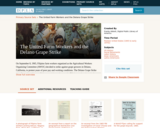
This collection uses primary sources to explore the United Farm Workers and the Delano Grape Strike. Digital Public Library of America Primary Source Sets are designed to help students develop their critical thinking skills and draw diverse material from libraries, archives, and museums across the United States. Each set includes an overview, ten to fifteen primary sources, links to related resources, and a teaching guide. These sets were created and reviewed by the teachers on the DPLA's Education Advisory Committee.
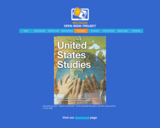
The fourth grade social studies book for the MI Open Book Project introduces students to geography, economics, history, and civics all through their study of the United States of America. Explore the regions and physical geography of the united states, learn about important economic concepts, and delve into the history of Michigan post statehood. A PASST performance task has also been included as students study the problems associated with sharing the water in the Great Lakes.
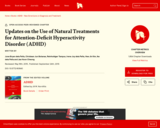
This is a peer-reviewed chapter in an open access book, ADHD. This chapter provides an overview of complementary and alternative medicine (CAM) and its relevance in psychiatric practice for the use of natural health products in the treatment of ADHD. Several botanical agents, nutritional interventions and supplements are reviewed. Results of the reviewed human clinical trials are presented in a concise tabular format. Methods, results, proposed mechanism of action, safety and efficacy are all addressed. The chapter is accurate, relevant, and clear. It is extensively referenced and is still relevant today even though more up-to-date literature reviews are available. It is a technical reading that is best suited to nurses, physicians, nutritionists, mental health workers and other allied health professionals at both the undergraduate and graduate level.

Subject discusses the broader trends in the labor market, how urban labor markets function, public and private training policy, other labor market programs, the link between labor market policy and economic development, and the organization of work within firms.
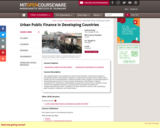
This readings-based course analyzes the structure and operation of government systems in developing countries, with particular emphasis on regional and local governments. Major topics include: the role of decentralization in national economic reform programs; the potential impact of decentralized governments on local economic development; determination of optimal arrangements for sharing fiscal responsibilities among levels of government; evaluation of local revenue and expenditure decisions; and assessment of prospects and options for intergovernmental fiscal reform. Emphasis is on basic economic concerns, with consideration given to political, institutional, and cultural factors.